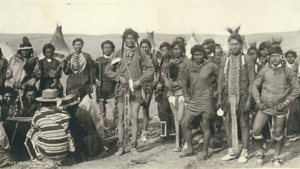As someone who has worn corrective lenses since I was 5 years old, I have often been drawn to descriptions of blindness within the biblical text. These days, my prescription is so strong that without my contacts, I would not be able to read text in a 12-point font unless I hold it about an inch from my face. Today’s vision technology allows me to navigate the world around me as a temporarily able-bodied person, but in the worlds behind the biblical text, such technology did not exist. Had I lived in biblical times, I would have almost certainly been counted as blind.
Thinking about this makes me wonder how I might have heard several biblical texts in the eras in which they were written. After all, it does not take an extensive search of Scripture to find one of the several passages that uses physical blindness as a metaphor for spiritual shortcomings or as a way of describing deficiencies (for example, Leviticus 21:18; Deuteronomy 28:29; Zephaniah 1:17; Isaiah 59:10; Matthew 23:16-26; Luke 6:39; John 9:2; 2 Peter 1:9; Revelation 3:17). Had I lived in biblical times where my own eyesight would, no doubt, have meant that I was disabled, how might I have experienced these passages? What would I have noticed then (with a disability) that I do not always notice now (with the benefit of corrective lenses that make the world accessible to me)? How might these, and other, biblical texts be heard in our own time when we still live in a society that is not fully accessible to everyone?
With questions like these in the background, I would like to offer here a modest foray into one specific biblical text (John 9) in which one specific disabling condition (blindness) appears. I hope that this example of reading the Bible while attuned to issues of disability can be illustrative of how a disability lens might be applied to other parts of Scripture as well
Exploring John 9 with a disability lens
Blindness figures prominently in John 9 with its account of Jesus’s healing of a man who has been born blind. While blindness is explicitly named in this text, reading this chapter with a disability lens might uncover a number of other aspects about the text’s (and our own?!?) assumptions about disability that might otherwise be ignored. In reading this text with a disability lens, several key aspects emerge:
- Disability is imagined as the result of sin
The account of Jesus’s encounter with the blind man in John 9 opens with a question from the disciples that suggests that their assumption is that the man’s blindness is the result of sin (9:2). Although JesusJesus is the Messiah whose life, death, and resurrection are God's saving act for humanity. More attempts to correct this assumption (9:3-5), the disciples are not the only ones to hold this view. Rather, as the narrative progresses, an antagonistic group of interlocutors questions the erstwhile blind man and affirms their own belief that he was “born entirely in sins” (9:34, NRSV). In short, then, although the narrative does not itself promulgate a view that disability is the result of sin, it nonetheless includes this perspective as a seemingly popular one. Reading this text through a disability lens might lead a reader to consider the ways in which the connection between disability and sin is present both in the biblical text as well as within our interpretive communities today.
- Disability is imagined as a deficit
To be sure, John 9 never explicitly states that blindness is a deficit that needs to be corrected. However, this view nonetheless permeates this story. In the narrative itself, there is no record of the blind man asking for healing or Jesus asking for permission to perform the healing. Rather, uninvited, Jesus simply performs a series of actions, gives the blind man instructions (without any context for why the man should follow the instructions or what the result of following these instructions will be), and ultimately causes the man to see (9:6-7). The narrative simply seems to assume that this change in the man’s ability to see is something to be welcomed and celebrated by all, including by the blind man himself who seems to have very little autonomy in determining what is being done to him or why.
This story, however, could have been told very differently. The blind man’s ability to navigate the ancient world without a trained service animal, Braille signage, or other features that would make the world more accessible to him could have been celebrated. His demonstration of the diversity of human experience and ability might have been used to illustrate the variety of individuals to whom Jesus appealed. Instead, though, the text seems to assume that the man’s blindness is a condition so pitiable that it warrants intervention even without the individual’s consent.
- The disabled person is questioned beyond his experience
Without providing a clear rationale for why he should be questioned in such a way, the narrative presents the erstwhile blind man as being subject to a host of questions about how the healing was effected (9:10, 15), where Jesus is located (9:12), and how he assesses Jesus (9:17). With the possible exception of this last question, these other questions force the man to speak about things about which he might have an opinion but for which he shouldn’t be assumed to be able to answer. Similar to asking questions like, “What do blind people want?” or “What do deaf people need?,” the questions posed to the erstwhile blind man in John 9 force him into speaking about something which he should not simply be assumed as an authority because of his disability. Just as one blind person should not be expected to speak to the experience of all blind people, this blind man should not be expected to speak on the whereabouts of someone who is a stranger to him.
- The disabled person’s expertise is questioned
Although the formerly blind man is assumed as an authority in some matters, he is dismissed as a legitimate authority in others where he does, in fact, have expertise. When a conversation about his identity breaks out following the restoration of his sight and the man tries to interject with an affirmation of his own identity (an area in which he is certainly the best expert! [9:9]), he is simply questioned further (9:10). The text even states explicitly that the man’s interlocutors refuse to believe him when he states his identity until they verify it with his parents (9:18). Although the text never explicitly states that the man’s disability is the cause of others’ refusal to believe him, it does not seem like too much of a stretch to imagine that others question his authority and expertise on the basis of his disability. In other words, he is assumed to be incompetent until he proves otherwise.
Reading the story in John 9 through a disability lens suggests that several aspects of the text might be concerning for what they assume about disability and disabled people. Although this does not preclude finding truth within this narrative, it does suggest that careful readers would do well to examine how these assumptions about disability within the text might rightly be questioned when the text is proclaimed as gospel truth for today.
Reading the Bible through a disability lens
I have explored here only one text that describes only one disabling condition. However, in reading the Bible through a disability lens, the careful reader would do well to attend to the many ways in which disabling conditions are described throughout the text. Readers might consider several questions when reading a biblical text through a disability lens:
- In what way does this text define or describe disability or disabling conditions?
- Is this text being informed by harmful cultural norms that need to be approached with caution by contemporary readers?
- Where can readers encounter the good news of a gospel of liberation in this text?
- How does attending to issues of disability in this text expand our understanding of the text and of God’s word as it is made manifest in this text?
These questions are not exhaustive by any means, but they may help to heighten our awareness of the models of disability that are already present in the biblical text and help us to discover a message of celebration for disability as it attests to the diversity of God’s good creationCreation, in biblical terms, is the universe as we know or perceive it. Genesis says that in the beginning God created the heavens and the earth. In the book of Revelation (which speaks of end times) the author declares that God created all things and... More.



